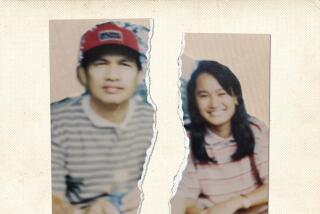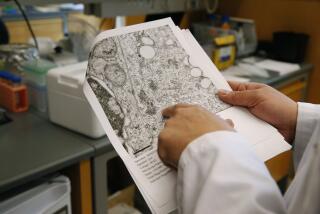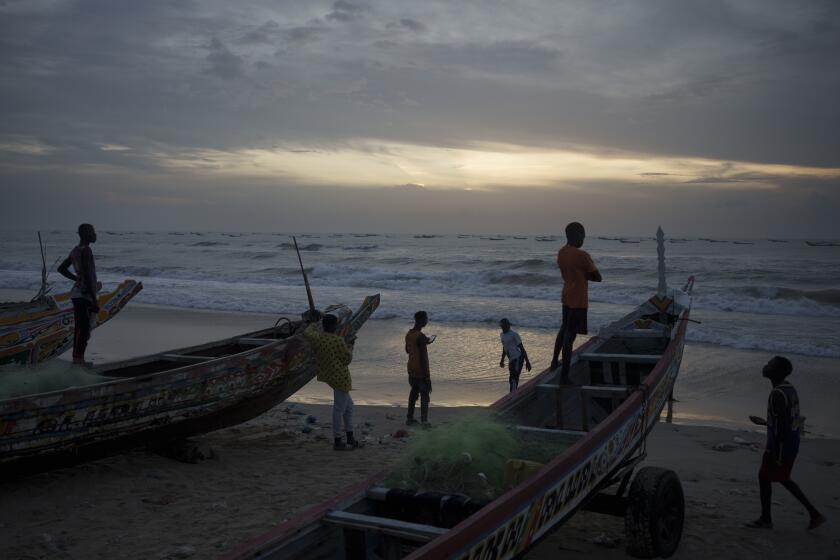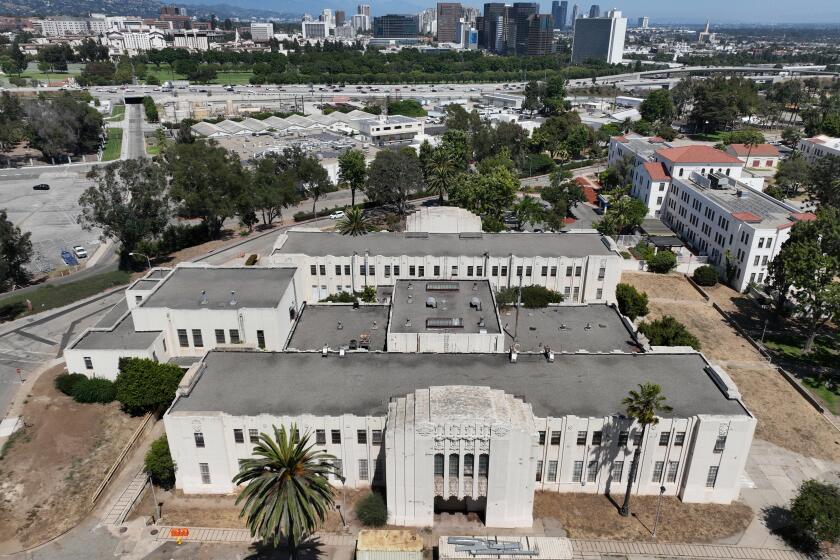An American ‘Mom’ to Immigrant Families
Early one morning the young Vietnamese woman awoke and discovered she could barely move. A rash she’d recently developed was much worse, and her already-swollen joints had stiffened further. When at last she forced herself out of bed, she found she was unable to bend over a nearby crib to tend her infant son.
In her new world in Southern California, the woman knew only one person guaranteed to help her. So, with enormous difficulty, she crept downstairs to the telephone. Before long, Joan Eichinger--accompanied by her son Dan and Dan’s Vietnamese-American wife--was speeding toward the woman’s rented room.
The three rescuers took the woman to the emergency room at UCI Medical Center, and while Eichinger’s daughter-in-law helped the immigrant with her limited English, Joan Eichinger tended the baby.
Later came four months of weekly, sometimes twice-weekly, trips to the medical center for many tests, while doctors puzzled over Phuc (not her real name) and her symptoms. Finally, a rare kind of stress-triggered arthritis was diagnosed.
Strong doses of aspirin would eventually reduce and virtually eliminate the problem, but throughout the six-months-long illness, Joan Eichinger was Phuc’s principal contact with the world, the one who took her to the hospital, helped care for her child and gave her emotional support.
“When I need something I call her, and she take me many times,” Phuc said recently. “I have nobody else to help, only call her. And she just help me like she help her daughter, I think.”
Telephone Greetings
Each Mother’s Day, the telephone at Eichinger’s house in Orange rings often with greetings and well-wishes from many admirers. Eichinger and her husband, John, an executive with 3M, have five children of their own, but that hasn’t kept Joan Eichinger from “adopting” a number of Cambodian and Vietnamese refugees of her children’s generation, as well as some older refugees. Many of the younger newcomers call her Mom.
In 10 years of volunteer work for the U.S. Catholic Conference of Bishops and the Catholic Immigration and Resettlement office of the Diocese of Orange, Eichinger believes she has touched the lives of upwards of 150 individuals she has seen “long enough so we would know each other.” She has also had brief contact with several hundred others.
At present, Eichinger has three refugee families in hand--two single women with young children and one still-intact but troubled family to whom Le-Phuong Eichinger, Joan’s daughter-in-law, has given many Sundays’ worth of marital counseling.
The elder Eichinger tries to smooth the refugees’ transitions to life in Orange County, and to young mothers she serves as a kind of role model, although, she says with a laugh, “I’m sure I’m not the perfect mother, so I wouldn’t want them to model everything after me.”
Grandmotherly Advice
Last Sunday, she paid an afternoon visit to Phuc. Almost before she had entered the young woman’s room, Eichinger was asked her opinion on little Tom’s bottom, which was red and looked inflamed beneath its diaper. “I think it’s urine burn,” Eichinger said judiciously, and helped smear a cooling ointment over the baby’s skin.
Throughout the talk that followed, while a reporter asked Phuc questions about her past and current life and her relationship with Eichinger, the older woman inserted motherly and grandmotherly advice on child care.
All the while, Tom, now a year old, crawled about over the bed, over Phuc, over Eichinger, occasionally pausing to smile at one or the other. “When he see you, he very happy,” Phuc told her friend.
Phuc did not want her true name published because she was afraid word would somehow reach her parents, who are still back in Vietnam, that she had borne a child without being married. “In my country we don’t live together before we get married, and that this happened to me is very bad.” she said, her soft brown eyes troubled.
Now in her early 30s, Phuc came to Colorado nearly three years ago from a refugee camp in Singapore, under the sponsorship of an uncle who was already in the United States. When the uncle died, she moved to Orange County.
Lonely and unsure of herself, she became involved with a man she believed was single. Not until she was pregnant did he reveal he was married. Phuc applied for admission to a home for unwed mothers but was turned down because she was over age 25.
The home, however, called the Catholic Conference, which referred her to Eichinger. That was almost two years ago. Now the father of Phuc’s child is divorced and would like to marry Phuc, but she is not sure this would work out. The couple lived together for a while, until Eichinger helped Phuc find her present housing.
“I learn from her (Eichinger) a lot of things. And I think I very lucky to have Joan,” Phuc said. “First time when the baby born I don’t know anything. Joan, she brought everything, she brought shirt for the baby, bed for the baby . . . If I don’t have her, I don’t know what I do.”
“You’d have made it some other way,” Eichinger said quietly.
Christian Motivation
Eichinger, a youthful-looking 59 despite her iron-gray hair, first became involved in volunteer work with refugees in 1975 “more or less against my better judgment,” she said. When the Vietnamese refugee camp was established at Camp Pendleton, her church, St. Norbert’s Catholic Church in Orange, sponsored several refugees.
Then, in 1977, the Catholic Immigration and Resettlement office established Santa Ana’s Hope House, an always-crowded temporary home for unsponsored refugees and other refugees whose sponsors were not quite ready for them. Eichinger helped the new arrivals adjust to life in Orange County through that program, which lasted about two years.
In the meantime, she had occasional live-in visitors in her own home, a practice that continues: A young Chinese man from Vietnam is the Eichingers’ foster son. Now 24, he has lived with them for three years while working to bring the other nine members of his family out of Vietnam.
When Eichinger began her volunteer work with refugees, her eldest child was 20. Her adult life had always revolved around her family, and she knew the children would soon be leaving.
Eventually, she said, “I ran out of being a mother, so this has filled in for me. And I love it--I love them (the refugees) as people. I only do it (this work) because I’m a Christian, because I love the Lord and I can see the Lord in these people. I don’t want to come across as super-religious, but I have a deep faith and I’m not ashamed of that.
“I don’t think I would have needed this, but I would have missed the most important 10 years of my life if I had said no (to working with refugees). It’s changed my life, it’s changed my husband’s life, it’s changed my children’s lives. It turned our lives around.”
Son Met Future Wife
It certainly changed Dan Eichinger’s life. It was as a volunteer for the Orange County Catholic Conference that he met Le-Phuong, whom he married in 1983. Shortly after the wedding, the young couple left for 15 months’ work as counselors and interviewers at a refugee camp in the Philippines.
The two have settled in Saugus, where Dan is a sales representative for a pharmaceutical company and Le-Phuong cares for their 8-month-old son, Matthew. Frequently, they visit the house in Orange, and frequently they are involved in Joan Eichinger’s volunteer work. Because Le-Phuong is fluent in Vietnamese, she is sometimes needed to help resolve crises in the immigrants’ lives.
The elder Eichinger doesn’t speak Vietnamese, but that doesn’t hinder her much, she said. “I can almost always communicate. It’s surprising how you can communicate if there’s a need.” What she offers, she said, is “sometimes not much--just a kind word, a smile.”
One of the young women with whom Eichinger is working escaped from Vietnam on a boat almost three years ago. In the course of her journey she was raped by pirates, and when she arrived in the United States, to a husband she hadn’t seen in several years, she was six months pregnant.
Her husband, who deeply loved the young woman, “moved his family away from Buena Park, away from all the cousins, he was so ashamed,” Eichinger remembered. When the baby was born, it was put up for adoption.
Three months after the birth, the woman became pregnant with her husband’s child. There followed a rather stormy time of adjustment, during which Le-Phuong frequently assisted her mother-in-law in long counseling sessions with the family. The two are still together.
Called ‘Extraordinary’
Although Eichinger insists she is “not any special person . . . I’m an ordinary person,” those who have worked closely with her don’t necessarily agree. Dorothy Brylski, director of the Catholic Immigration and Resettlement office, called Eichinger “a very dedicated, loving person” who does the work of five people. “We have a number of people who do the same (kind of work) but not to the extent that Joan does. Joan is very extraordinary,” Brylski said.
Most of the volunteers work with families “just until they get settled,” but Eichinger usually stays with her “adoptees” much longer, the director added. Brylski said she would not mind having more such volunteers turn up, because “we have a lot of sad cases that we just wish we had more time to help.”
Senior Counselor
Marianne Blank, a senior counselor in employment services for St. Anselm’s Immigrant and Refugee Community Center in Garden Grove, agrees.
“A lot of my clients want desperately to have American friends and they’re (often) finding it very hard” to make such friends because of the differences between cultures, Blank said. Stacey Holmes, a sponsorship developer for the World Relief Corp., also noted a strong need for donated help. “So many people don’t even know that refugees are still coming into Orange County and that they can get involved with these people,” she said.
‘Can Only Do What I Can’
Eichinger would agree that more volunteers could be put to use working with the refugees. She herself tries not to take on more than three or four families at a time, because “I realize that I can only do what I can do.”
“There is a need for people who really can put some time in, and not just for a month,” she said.
“Volunteers are needed. I know what a difference it would make if there were even 10 more people doing this--people who have compassion, and some time.”
More to Read
Sign up for Essential California
The most important California stories and recommendations in your inbox every morning.
You may occasionally receive promotional content from the Los Angeles Times.










